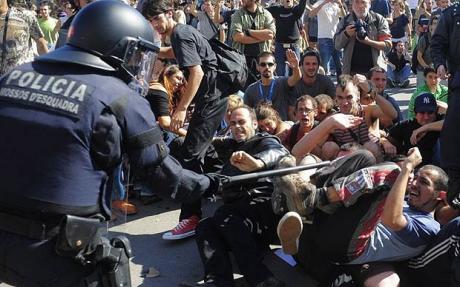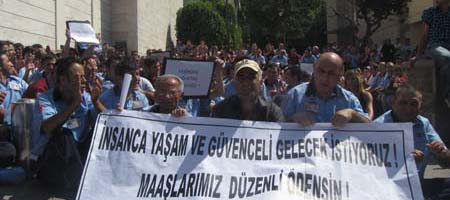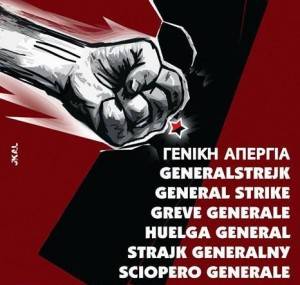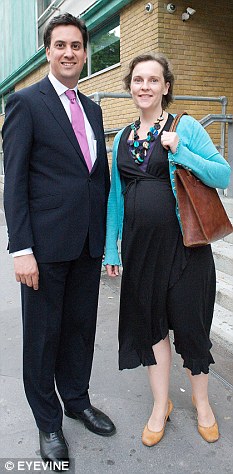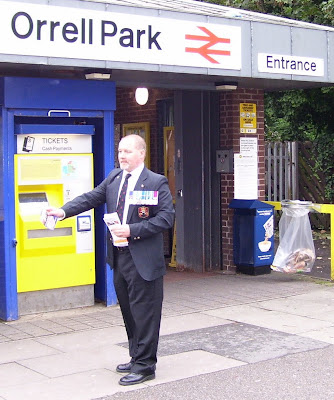On Sunday, a conversation on Twitter with John Demetriou - a right-libertarian blogger - inspired him to write a post called "What have left and right libertarians got in common?" What follows is my response.
Demetriou, hereafter JD for brevity, is an interesting case amongst right-libertarians. I've cited him previously as being "far more honest and consistent in his libertarianism" than his peers, and I stick by that. He realises the utter lunacy of "anarcho"-capitalism and is closer to mutualism in his ideology.
But I digress. His post was prompted by my tweeting that "there are lots of areas of agreement between libertarian right and left. But blogging only seems to overlap on economics [where we disagree]." And "it would be interesting, for example, to read right-libertarians on fascism, illegal wars, nationalism, migration, et al."
With a rapidity that my response has failed to match, JD rose to the challenge, offering his opinion on exactly those subjects.
On fascism, nationalism, and migration, his perspective diverged from mine quite broadly. I will come to that. However, having already written a great deal on the irreconcilable differences between left- and right- libertarianism - see here, here, here, and here - I would like to go first to the commonalities.
On this point, JD is quite eloquent;
I think the best way to improve relations with other countries and to encourage better relations across the world is to essentially trade. Trade civilises. Trade is good. Business and commerce is good. Why drop bombs on Afghanistan, when we should legalise all drugs and buy their heroin from them and sell it at below dealer rates in the UK in order to destroy the illegal drugs industry?
Why feed despotic, pernicious regimes in the Middle East (like Saudi) because we want to sate our miserable addiction to oil, when we can simply junk our dependence on oil and move towards a transport system based in renewable energy?
This is where left libertarianism comes in - it can energise and educate people to realise the destructive nature of the oil industry and why it poisons just about everything in the world.
Left and right libertarianism has much in common, and while our differences may seem stark, and our paths meander off into random directions, we can agree and shake a friendly hand on the fact that our one main enemy is the state. The further you go to the extremes (anarchism, Anarcho-Capitalism), the more you believe the state should not exist.
Let me leave you with this image from a great film I watched recently called 'The Bucket List' with Morgan Freeman and Jack Nicholson. If you have seen it, you might want to muse on why I draw the parallel between this discussion and this film.
Because for me, Freeman's character is like a left libertarian and Nicholson's is like a right libertarian. One is a rich billionaire, the other is a man of modest means. One is brash, caustic and obnoxious, the other is charming and a gentleman. When brought together, they have a turbulent relationship, but dedicated common ground can bring great things...
I'm not of the opinion that the libertarian spectrum can or does play out like a political buddy movie. There is common ground, and there are even areas where opinions from the left and right compliment one another. But the elephant in the room is the economy, stupid, at as a result there will always be antagonism.
Perspectives on the state are part of this. For left libertarians and anarchists, the state is our enemy because (to varying degrees) it represents an authoritarian and hierarchical structure. We are equally suspicious of such structures outside of the state, whilst with many - if not all - right-libertarians there is the suggestion that authoritarianism is acceptable if privatised.
Nonetheless, sticking to common ground, I would agree there is a lot of it. For example, whilst we lefties "come in" on the issue of foreign wars and the oil industry, I have no problem letting the libertarian right have at it on smoking bans, free speech, and other such issues.
Going back to fascism and such things, here we find that common ground remains, but it is an awful lot more sparse.
For example;
For me, fascism cannot be blithely dismissed as a right wing political creed. This is lazy. Fascism is extremely similar to its opposite number; communism (or hardened socialism). They both want a massively powerful state, led by an elite, who dictates everything on behalf of the people who they pretend to laud and love. Both communism and fascism are scathing of capitalism, and Jews, and they are quite aggressive and imperialistic, though for slightly different reasons.
I believe the differences are tiny. The reason fascism gets the right wing tag is pretty much because of its latent nationalism and obsession with race and eugenics.
Although there is an issue with calling fascism "right wing" or "far-right" in terms of the economic left-right line, it does not follow from this that it is socialist or left wing.
As I have argued before, fascism is the logical, extreme of the status quo. That is, corporatism, nationalism, authoritarianism, and rigid bureaucracy. It has traditionally found support from the business classes, and been used to smash picket lines and organised workers as a movement.
It should also be noted that capitalism is not synonymous - or, for that matter, at all compatible - with free markets. It is a social order, wherein state and corporate power are intertwined.
I won't defend "Communism," quite simply because I don't believe in it. The oppositional perspectives of anarchists and Marxist-Leninists is well known and doesn't need rehashing here. Suffice to say that the USSR wasn't socialist after 1921. At the latest.
JD's claim that "as long as left libertarians constantly see fascism as a right wing movement, they will persistently fail to spot the inherent flaws in socialism" is at best facile. We know well what socialism is and what it is not - which is why we are in non-hierarchical, decentralised groups such as the Solidarity Federation rather than towing the line of the Socialist Workers' Party.
Further to which, the idea that "can only really ever exist where it is guided by a very strong, coercive elite in dominance of a very strong state" is a falsehood.
Though it was short-lived, the Spanish Revolution showed communism to be quite the opposite. In fact, as in Russia, it was clearly the case that those "in charge of a very strong apparatus of thuggery and tyranny" destroyed communism rather than bringing it to pass.
JD is harsher on nationalism than I. I would agree that it is "an emotional sop" and "pointless way of seeking an identity and a way of seeking meaning."
However, where I have sought the root of such sentiments and ways to challenge it for leading working class discontent up a blind alley, he simply writes those who think that way as "the types of people who flip burgers and fit tyres to down tools every generation or three in order to 'defend the realm'."
Beyond which, JD is "ot one of these cunts who wants to do away with 'countries' and just have the world as one big meadow of goats with no borders and loads of women with lank hair dancing round Maypoles." But I am, and as he points out whilst there are a fair amount of minarchists on the libertarian right, they are few and far between on the left.
I won't go into the arguments in detail here. But in response to his suggestion that a minimal state is neccesary and anarchism "would only work in a very ideal world which can never exist," I suggest he reads my case against borders, and my posts on how community self-defence and self-organisation would work.
Anarchism is not a pipe dream invented by stoned students - it is an idea rooted in over 150 years of trial and error. After all, an ounce of action is worth a ton of theory.
Returning to the original point, I would say that there is far too much difference for any kind of consensus between the libertarian right and left. But we are not two separate, homogenous camps - there is an entire spectrum of libertarian thought and so great potential for overlap.
With the exception, of course, of anarcho-capitalists, Randian objectivists, and big-L Libertarians like Ron Paul. I'm unrepentant that they're just corporate capitalists lacking access to the whip.


